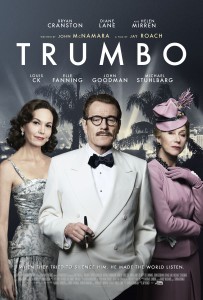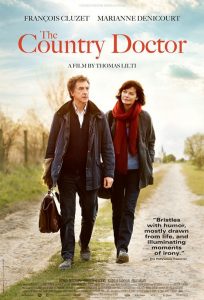In the late 1940s Dalton Trumbo (Bryan Cranston) was a screenwriter with a talent that placed him at the vanguard of the Hollywood elite. He wrote, among many other titles, Roman Holiday, Johnny Got His Gun and most famous of all, Spartacus. However, in post-War America with the Cold War beginning its sinister journey across the 20th century, Trumbo’s outspoken support for workers unions and the fact that he was a card-carrying member of the Communist Party of the USA meant that his days at the forefront of Hollywood were numbered.
Trumbo was one of ten screenwriters put before Congress to stand trial for supposedly spreading communist propaganda through films. This was a man at the top of the Hollywood game – imagine if Aaron Sorkin or Charlie Kaufman were suddenly arrested and barred from writing scripts. He ended up going to jail for his defiant stand, and once he got out he resorted to writing films under pseudonyms, drawing other excommunicated writers into the fold and creating scripts that would turn into what is now known as the blacklist. In 1960 Trumbo was approached by none other than Kirk Douglas (Dean O’Gorman, who actually looks uncannily like a young Kirk Douglas) to write the screenplay for the film that Stanley Kubrick eventually made into Spartacus.
The communist witch-hunts that infected Hollywood at the behest of the House Committee on Un-American Activities have laid the foundations for some great films, George Clooney’s Good Night and Good Luck comes to mind. It also had a huge influence on other media such as The Crucible and On the Waterfront, and this latest cinematic offering by Jay Roach, who brought Austin Powers to the big screen, is for the most part a well-intentioned and thoroughly enjoyable history lesson.
Bryan Cranston has received his first Academy Award nomination for playing Trumbo and it’s easy to see why. Constantly sucking down smoke through a cigarette holder and sporting a very impressive array of facial hair, Cranston brings to life this man who was such an important part of 20th century film-making with his signature wit and gravelly voice. Cranston is the driving force behind the drama and it’s he who elevates the film above the TV movie that it occasionally resembles. His supporting cast don’t get to do nearly as much. John Goodman is always a lot of fun and he’s no different here, and Helen Mirren, as a columnist who puts today’s venomous gossip rags to shame, is clearly having fun. The rest of this impressive cast which includes the likes of Diane Lane, Louis C.K. and Michael Stuhlbarg are wasted.
Much of the historical accuracy of this film has come under scrutiny. It certainly seems like a lot of events have been trimmed to fit in with the story, and most of the characters feel like they’ve been airbrushed so that everyone falls into neat categories of ‘goodies’ and ‘baddies’ in a sentiment that would make Tony Abbott smile. It comes across at times like we’re watching a fan-fiction representation of history.
That said, it’s better to leave the historical accuracy to historians and biographers. After all is there any historical film that can fully qualify as ‘accurate’? History is simply the stories we tell ourselves; it’s nothing more than a representation of the past usually told for a specific purpose. Trumbo comes out at this very interesting current time that is feeling the resurgence of the Left and we find ourselves in late-stage capitalism. Roach’s film becomes even more interesting when it’s read as a comment on our current time as well as telling the story of Hollywood’s infamous Blacklist era.
Despite an occasionally simple narrative with all the potentially rough edges sanded down, Jay Roach has created a very enjoyable film which brings to life John McNamara’s snappy script with a fantastic lead performance. For those of us who love 20th century history and Hollywood, any film that combines the two is worth checking out.
Trumbo is in cinemas from 18th February through Entertainment One.





